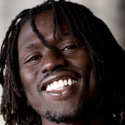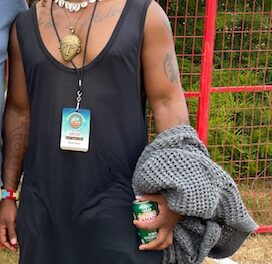Emmanuel Jal: From South Sudan with love.
Even before South Sudan became an independent state in the summer of 2011, there were people out there who were already planting their artistic seeds musical scene of soon-to-be-born country. One of them is South Sudan-native Emmanuel Jal, who despite living in the UK, has helped through his music make from his newly born mother country a better place.
Emmanuel Jal may now be a seasoned musician that has performed in various countries around the world, but his story is also one of a lot of political and social nuances: As a kid, he was forced to serve as a child soldier. After fleeing and settling in the UK, he undertook a musical career through which he has also helped to raise awareness about child soldiers in Africa and its devastating consequences. Also, he is actively engaged in social work towards the development of South Sudan.
In a visit to Vancouver as a guest of the Vancouver Folk Music Festival 2011, Taste and Sip magazine spoke with Emmanuel Jal to learn more about his life and his music. Here is what he told us:
ET: You are a rising star, you are from South Sudan which is the newest country in the world right now. Seems that you have a very strong cultural role on it. How do you feel about it?
EJ: It’s so exciting, I wanna give thank you to every person who has played a part in bringing awareness about the issues in South Sudan, or any person who donated or worked for the UN, or any person who supported anything to do with people of South Sudan, I wanna say thank you because finally we have got our freedom. 2.5 million people died in the world’s very eyes. But finally now we are free and I’m very happy to be part of the building of a new nation.
ET: Do you feel a strong responsibility in helping to build the new country?
EJ: The role I played was to create awareness abroad. The other part that I played back at home was to try to put people in school and education. So I’m gonna do the little things that any citizen does for their country. The government doesn’t do much because the government’s main job is to provide security so that people can move freely, free economy, make it easier for business people to trade and get business working. But it is actually the citizens who build the nation.
ET: Your music style seems to be very fresh and vibrant. You certainly had people over the show jumping and dancing. What’s your inspiration to come up with this fresh style?
EJ: When I go on stage I tend to enjoy with people, I tend to let them know ‘you are part of this. We are putting this for you’. Today it was just jamming, so there was no complete track for us to do. So it was just jamming with the band and do anything, so I was actually struggling in my head with ‘what do I say?’ The words just kept coming. It just happened.
ET: Did you feel like you had a connection with the people of Vancouver?
EJ: Of course! We had a connection.
ET: Is this your first time performing in Vancouver?
EJ: I came to speak in Vancouver before, but this is the first time performing properly.
ET: I’ve seen that you have appeared in magazines and TV in Canada before, so certainly your fame precedes you. Do you feel satisfied with the reputation that you have gained in Canada so far?
EJ: It’s really exciting to see Canadians embracing me and welcoming me, so it’s very encouraging in terms of economy and support to develop myself as an artist. It’s difficult as a conscious artist to exist —-, but Americans and Canadians have begun to embrace this. It’s really exciting to be in the front cover of a local magazine here
ET: Some of the local magazines have featured your activism. You have been really involved in campaigns against child soldiers not only in Sudan, but everywhere. Do you fell that your message is getting through the way you want it across the world?
EJ: It took long time, but now it’s really exciting that I’m beginning to find an audience helping me to push the world. It’s a collaboration work with everybody, we all do our little thing to do the bigger thing.
ET: What projects are there in the future for you?
EJ: I have so many projects! My mind keeps working. One of the latest projects that I’m doing now is called “Responsible Tourism”. I’m trying to organize volunteers to come to South Sudan. Sometimes people just want to go on a tour, but with “Responsible Tourism” I put together a management team to work for a charity or school. People are really excited and want to come because it doesn’t really affect them that much, because when we attach them to the charity or the cause they donate directly to that cause in South Sudan. This time I’m gonna be a modern-day nomad, I will be telling my story and performing and asking young people ‘what are you willing to lose to make this world a better place?’ It’s a lot about asking people and getting people on the road.
ET: Do you feel a lot of involvement by people in this program already?
EJ: Yes, people are involved. The website is going to be built and how we can track who is losing what. Somebody can lose their chocolate, someone can vow not to take a taxi for a month.. we have amazing people coming up with different ideas. Someone said they spend two hundred dollars in massages a week, so he wants to lose at least two weeks of his massage in a month and he’ll donate that money. So every person is different on what they want to lose. People tend to remember more when then lose something.
ET: This are like sacrifices, then?
EJ: Yes
ET: Seems that your performance in Canada has been well received by the audience. Are you hoping that they will set a platform for you to launch your projects here as well?
EJ: Yes, this festival is going to be big for that. Most of the crowd that is coming to the festival are good people. This is like a “good people’s festival”, so my work is just to come and inspire so that we can go out there and do the great stuff.
ET: Is there a message that you would like to leave for the young people of Vancouver?
EJ: What I would say is that those who are more fortunate have a greater responsibility to make of this world a better place.



